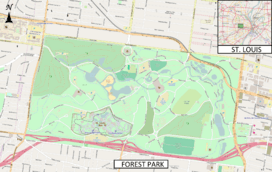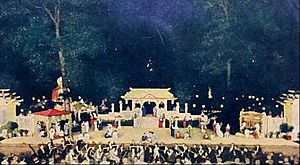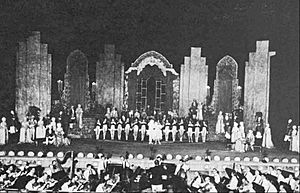The Muny facts for kids
|
The Muny
|
|
| Former names | Municipal Theater of St. Louis (1917-19) |
|---|---|
| Address | 1 Theatre Dr St. Louis, MO 63112-1019 |
| Location | Forest Park |
| Coordinates | 38°38′26″N 90°16′50″W / 38.640560°N 90.280484°W |
| Public transit | |
| Owner | Municipal Theatre Association of St. Louis |
| Capacity | 11,000 |
| Construction | |
| Opened | June 5, 1917 |
| Renovated | 1923, 1930, 1935, 1997, 2004, 2014–15, 2018-19 |
| Construction cost | $10,000 ($269 thousand in 2022 dollars ) |
The St. Louis Municipal Opera Theatre (often called The Muny) is a huge outdoor theater in St. Louis, Missouri. It can hold 11,000 people, and about 1,500 of the seats in the back rows are free! You just need to get there early to grab them.
The Muny puts on shows every summer, usually from mid-June to mid-August. It's run by a nonprofit organization, which means it's not trying to make money for owners, but rather to provide entertainment and education. Kwofe Coleman is the current president, and Mike Isaacson is the artistic director.
Contents
The Muny's History
The idea for The Muny started in 1914. A man named Luther Ely Smith began putting on outdoor plays and shows called "pageant-masques" on Art Hill in Forest Park. In 1916, a special spot between two oak trees was chosen for a play called As You Like It. This play had a huge cast of 1,000 local dancers and singers.
Building the First Outdoor Theater
Soon after, leaders in St. Louis wanted to create a big entertainment event for a convention. Mayor Henry Kiel and others worked quickly. In just 49 days, they built the first outdoor theater owned by a city in the United States.
On June 5, 1917, the very first show, an opera called Aida, was performed on what would become The Muny stage.
How The Muny Got Its Name
In 1919, the new theater got its official name: St. Louis Municipal Opera Theatre, or "The Muny" for short. The first show under this new name was Robin Hood, which opened on June 16, 1919. Even Mayor Kiel acted in this show, playing King Richard!
Before another large outdoor venue opened in 1991, The Muny also hosted many concerts.
Early Improvements to The Muny
By 1921, The Muny had a new, strong stage made of concrete. This helped protect the equipment from floods, like one that caused damage in 1919. In 1922, more improvements were added, including a new covered walkway, 750 permanent seats, and parking for 500 cars.
In 1923, 1,800 more permanent seats were added. They also built an extra stage for rehearsals and a sound system so everyone in the audience could hear the show clearly.
Training Future Performers
On January 4, 1923, The Muny started a free school. This school was for people who wanted to sing in the chorus for the summer shows. Many people applied, and classes met twice a week to prepare for rehearsals.
Changes in Leadership
In 1924, Mayor Kiel stepped down from leading The Muny, saying that business leaders should be in charge. H. J. Pettengill, a chairman from Southwest Bell Telephone Company, became the new president.
In 1925, The Muny started offering reserved seats for all paid tickets. Before this, some sections were first-come, first-served.
Stage Upgrades and Youth Programs
In 1930, the stage got a cool new feature: a turntable! This allowed sets to be changed quickly during performances. This turntable was rebuilt in 1997 and replaced again in 2018-2019 as part of big renovations.
In 1994, The Muny started the Muny Kids program. This was a special group of performers aged 7 to 13 who performed around St. Louis and gave preview shows before the main productions. In 1998, the Muny Teens group was created for performers aged 14 to 18, doing similar work.
How The Muny Produces Shows
The Muny creates all of its own musicals, usually seven each summer season. Even in the winter, a team of 35 people works full-time to get ready for the next summer. During the summer season, the staff grows to over 500 people!
Each show is rehearsed very quickly, in just 11 days. There are usually two technical rehearsals right before a show opens. Shows typically run for 7 days, with a short break of two to three days between shows to change sets and prepare for the next production.
Muny Magic at The Sheldon
Since 2015, The Muny has also put on special concerts called Muny Magic at The Sheldon. These are smaller, cabaret-style concerts held at the Sheldon Concert Hall. They feature artists who have performed on The Muny stage. The Muny's Artistic Director, Mike Isaacson, often announces the lineup for the upcoming summer season at these spring concerts.
Concerts at The Muny
For many years, The Muny also hosted live concerts when musicals weren't playing. The last one for a long time was in 1991. Many famous artists have performed on The Muny stage, including Whitney Houston, Patti LaBelle, Sting, Barry Manilow, Bob Dylan, The Beach Boys, and James Taylor.
In 2024, The Muny brought back this tradition! They had their first live concert in over 30 years, starring the award-winning artist John Legend. He performed with the St. Louis Symphony Orchestra. The Muny's President, Kwofe Coleman, said they were excited to bring back this "bit of nostalgia" for the community.
See also
- List of The Muny repertory
- List of contemporary amphitheatres
 | Aurelia Browder |
 | Nannie Helen Burroughs |
 | Michelle Alexander |




